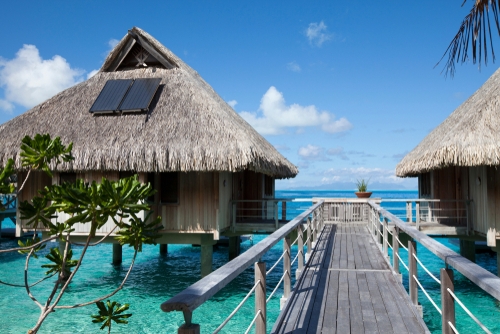Besides being shown to reduce stress and depression, travelling gives us a unique opportunity to experience different cultures and cuisines, appreciate the beauty of nature, improve our self-confidence, communication and creativity through new experiences, and of course, make lifelong memories.
But how can we travel without hurting the planet? According to research conducted by IHG Hotels & Resorts, one-third of adults want to be more environmentally and socially conscious on their travels. And the good news is that it’s becoming increasingly easier to do so, no matter what you hope to get out of your travel experience.
So, what does sustainable travel actually mean? We’re not just talking about cycling through Italy’s rolling green hills – though that does sound quite idyllic.
Sustainable travel is about taking a holistic approach to your adventures, being mindful of the environmental, social and economic impact on host countries and communities. That could mean being more mindful of where you lay your head at night or how you choose to spend your money.
It starts with a destination. But when you’re planning your adventure, you may want to consider whether those Instagrammable sites are your best option if you truly want to have a positive impact.
That lush looking resort in the Maldives? It may be putting pressure on local water resources. The exotic Roman ruins all of your friends are visiting? They could be at risk of being lost due to degradation from high visitor numbers.
Meanwhile that all-inclusive resort that influencers are flocking to in Kenya may be owned by an international corporation that doesn’t give back to the local economy.
Today, there are some wonderful locations to choose from that value sustainability. For example, Costa Rica was one of the first countries to promote responsible tourism to help protect its unique biodiversity.
Scotland has long been known for its rewilding projects that are helping to conserve popular sightseeing spots. And Slovenia has introduced a green tourism scheme while formally protecting one-tenth of its rolling countryside.
Struggling to decide where to go? There are an increasing number of sustainable travel agents and operators who can help you find a destination or package that ticks all of the boxes.
Keep in mind both the environmental and social benefits by looking for trips that support the community and economy by employing local staff, partner with local non-profits or community organisations, are committed to environmental schemes such as carbon offsetting, or that campaign for positive change in the tourism industry.
Some worth looking into include Joro Experiences and Pura Adventure. That said, even if you do opt for a more traditional destination, there are plenty of other ways you can be more mindful about your trip.
Consider your carbon footprint transportation, including air travel and driving, make up the largest part of the tourism industry’s carbon footprint.
While it may not always be possible to avoid air travel (the biggest culprit) you can be more mindful of the way you fly.
Look into airlines that use cleaner fuels or even aviation biofuel, choose a direct flight where possible, and consider schemes that allow you to offset your carbon emissions, such as NativeEnergy or Trees4Travel when booking your trip.
Once on the ground, greener modes of transportation include buses, coaches and trains. Cycling is also a great way of getting around, but if you do rent a car, try to get an electric or hybrid model.
Keep in mind that some destinations may offer specialist sustainable transport options too, so do your research. As of 2017, all electric trains in the Netherlands are powered by wind energy, while some of Thailand’s famous tuk tuks are electric!
Plan ahead
From booking activities and accommodation, to packing your suitcase, travelling with intention involves plenty of research and consideration. Avoid expat-owned hotels and international chains in favour of locally-owned guesthouses and homestays, or sustainable hotels that perhaps use renewable energy or have a zero-plastic policy.
When planning your itinerary, look into companies that support the local economy in a sustainable way. That could mean visits to local markets, tours led by local guides, or workshops that teach local skills.
Ensure that the toiletries you pack are made with biodegradable materials to avoid contaminating local water supplies and opt for reef-safe sunscreen. And don’t forget to pack your plastic-free essentials too, so you can avoid unnecessary single-use plastic when you’re away. Reusable bottle? Check!
Keep it local
Once you arrive at your destination, travelling with intention can become a lot more fun, from exploring the local cuisine to shopping for keepsakes. Throughout your trip, avoid Western outlets and chains and instead dine at locally owned spots.
Seek out local dining experiences over mass-produced meals that are likely to contribute to food waste, such as buffets, and make the most of local, seasonal ingredients that are often fresh and delicious.
Want to take home souvenirs or gifts? Steer clear of the tourist traps in places such as airports, hotels and malls, and instead seek out independent outlets that are likely to sell authentic products that support the local economy.
Don’t be caught out by greenwashing
Greenwashing is rife in the tourism industry, with many hospitality and tourism brands cashing in on the trend by marketing themselves as more sustainable than they truly are. Be sure to do your research, reading into a company’s practices to ensure they live up to their claims.




_825_589_int.JPG)





